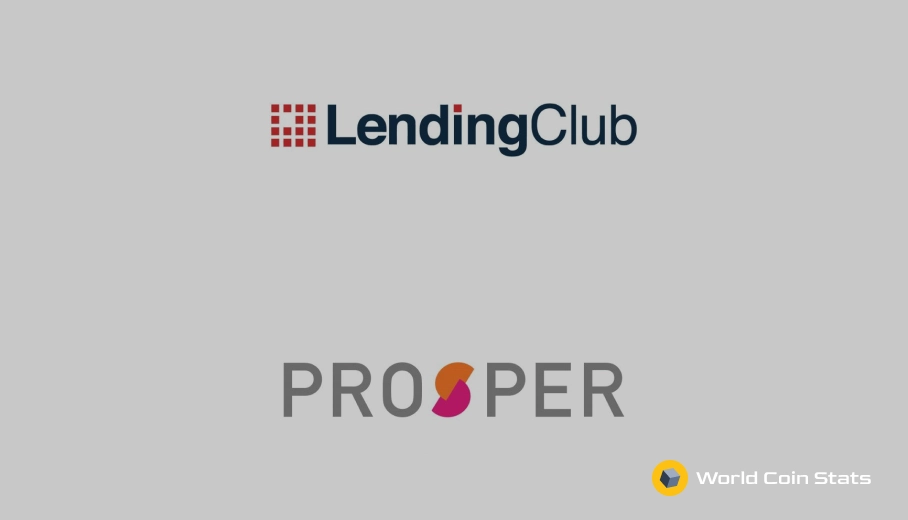LendingClub vs. Prosper: Which Is Better for You?
Nowadays, almost every person has set a financial goal. For instance, paying off credit cards, consolidating existing debt, paying off a tuition fee, or covering everyday expenses are among the most common purposes why people borrow money. It is no surprise that people want to pay off their debt and become debt-free.
Thankfully, peer-to-peer lending companies like LendingClub and Prosper connect borrowers with individuals who fund the loans and set interest rates. In fact, these are two of the most recognized and largest online lending companies. Since 2006 and 2007, both lenders have issued billions in loans for debt consolidation, home improvement, and other purposes.
LendingClub and Prosper have different borrower qualifications. For example, the average borrower score is between 699 and 710. Typically, LendingClub accepts joint applications, which can boost approval odds, while Prosper accepts applicants with higher debt-to-income ratios.
In other words, consumers who want to qualify for personal loans have to have a good credit history. On the other hand, consumers with lower credit scores can still apply. Both LendingClub and Prosper consider additional factors such as the information from your application, information about you from credit bureaus, your annual income, etc. Also, other information that might predict the likelihood that you will make on-time payments until your loan is fully repaid.
But which lending company is better for you? What are the differences between these companies? We will compare the fees, the approval processes, and the special features. So, by reading this article, you will find out not only what the differences and similarities between these two are, but you will also have enough information to decide which peer-to-peer lending company is better for your financial goal given your current income.
LendingClub Corp | NYSE: LC
LendingClub is a reputable peer-to-peer lending company that has been operating since 2007. The company matches borrowers with investors who are willing to fund the loans. With a lengthy credit history and a good credit score, LendingClub has become one of the most preferred online platforms.
Since 2007, the company has issued more than $36 billion in loans, including personal loans. In 2017, the company accounted for or $8.987 billion in loans. In addition, most borrowers use their loans to refinance a home or pay off credit card debts.
Qualifying For a Personal Loan
Currently, customers who want to borrow money through LendingClub must be a United States citizen or permanent resident and at least 18 years old. Another requirement of LendingClub is a valid bank account, as well as at least three years of credit history.
Also, customers have to have a minimum credit score of 600. Further, there is no minimum income requirement. However, the average borrowers’ income is around $76,135.
Moreover, LendingClub allows adding a co-borrower. In this case, people who can’t qualify on their own will have better chances of being approved. If their combined debt-to-income ratio should be below 35% and they have a combined credit score of at least 1140, then they will pass the minimum requirement.
Typically, the entire approval process might take up to 10 days for you to apply for a loan, get approved, and to receive the fund in your bank account.
Rates And Fees For a Personal Loan
Typically, the LendingClub’s annual percentage rate (APR) ranges from 6.95% to 35.89%. Further, all personal loans have fixed rates and fixed monthly payments. In addition, at this peer-to-peer lender, the APR includes the yearly interest rate and the origination fee.
The origination fee is a one-time fee that ranges from 1% to 6%. If you receive the loan you have applied for, then this fee will be included in the APR. Also, the amount of the origination fee depends on your credit rating as well as the information in your application.
Further, LendingClub charges no fees or penalties if you can make additional payments or even pay off your loan in full at a particular time. However, if your payment is more than 15 days late, you may be charged a late payment fee of 5% of your unpaid payment or 15$, whichever is greater.
Business Loans and Loan Amounts
If you apply for a personal loan, the amount generally ranges from $1,000 to $40,000. On the other hand, LendingClub has a separate lending platform for small-business loans. The loan amounts there are up to $300,000.
In short, LendingClub might be better for your financial goal if you:
- Have a co-borrower
- Need a personal loan, auto refinance loan, small business loan
- Have a debt-to-income ratio of 40% or lower
Prosper
Prosper is a peer-to-peer lending company that has been operating since 2006. According to reputable online sources, since 2006, the company has issued more than $16 billion in loans. Moreover, Prosper offers loans for various reasons, such as debt consolidation, home improvement loans, medical loans, etc.
Qualifying For a Personal Loan
At Prosper, the minimum credit score is 640, which is even higher than with LendingClub. Also, the average minimum credit score at this peer-to-peer lender is 717. In other words, Prosper focuses on people with strong credit, high income as well as good credit history. However, the company also approves borrowers who have significant existing debt.
Further, Prospers’ debt-to-income ratio is up to 50%, including the mortgage. Meanwhile, at LendingClub, the maximum debt-to-income rate is 40%. Both peer-to-peer lending companies offer loans for either a three- or five-year term. Furthermore, there is no minimum income requirement. However, the average borrowers’ income is around $89,000.
Moreover, like LendingClub, Prosper offers the option of adding a co-borrower, thus improving your chances of getting a loan or even a lower rate. Prosper caters mainly to borrowers with strong credit, high income, and well-established credit history. It accepts applicants with credit scores of 640 or above. Further, similar to LendingClub, the entire approval process might take up to 10 days for you to apply for a loan, get approved, and to receive the fund in your bank account.
Rates And Fees For a Personal Loan
Typically, the Prosper’s annual percentage rate (APR) ranges from 6.95% to 35.99%. Here as well, the APR includes the origination fee of 2.4% to 5%. In addition, Prosper charges a $15 fee for insufficient funds.
Further, the company, similar to LendingClub, doesn’t charge anything to make extra payments or pay your loan off early. It has the same late payment fee of 5% of the amount due or $15, whichever is greater, after a 15-day grace period.
In short, Prosper might be better for your financial goal if you:
- Carry substantial debt
- Have a high income and credit score
Overall: LendingClub vs. Prosper
Loan amounts
LendingClub: $1,000 to $40,000
Prosper: $2,000 to $40,000
APR range
LendingClub: 6.95% – 35.89%
Prosper: 6.95% – 35.99%
Origination fee
LendingClub: 1% to 6%
Prosper: 2.4% to 5%
Loan durations
LendingClub: Three or five years
Prosper: Three or five years
Minimum qualifications
LendingClub: Credit score of 600
-
- Credit history of three years
- A debt-to-income ratio of 40%
Prosper: Credit score of 640
-
- A debt-to-income ratio of 50%
A good option for:
LendingClub: Debt consolidation
-
- Co-borrowers
Prosper: Debt consolidation
-
- Borrowers with high debt




